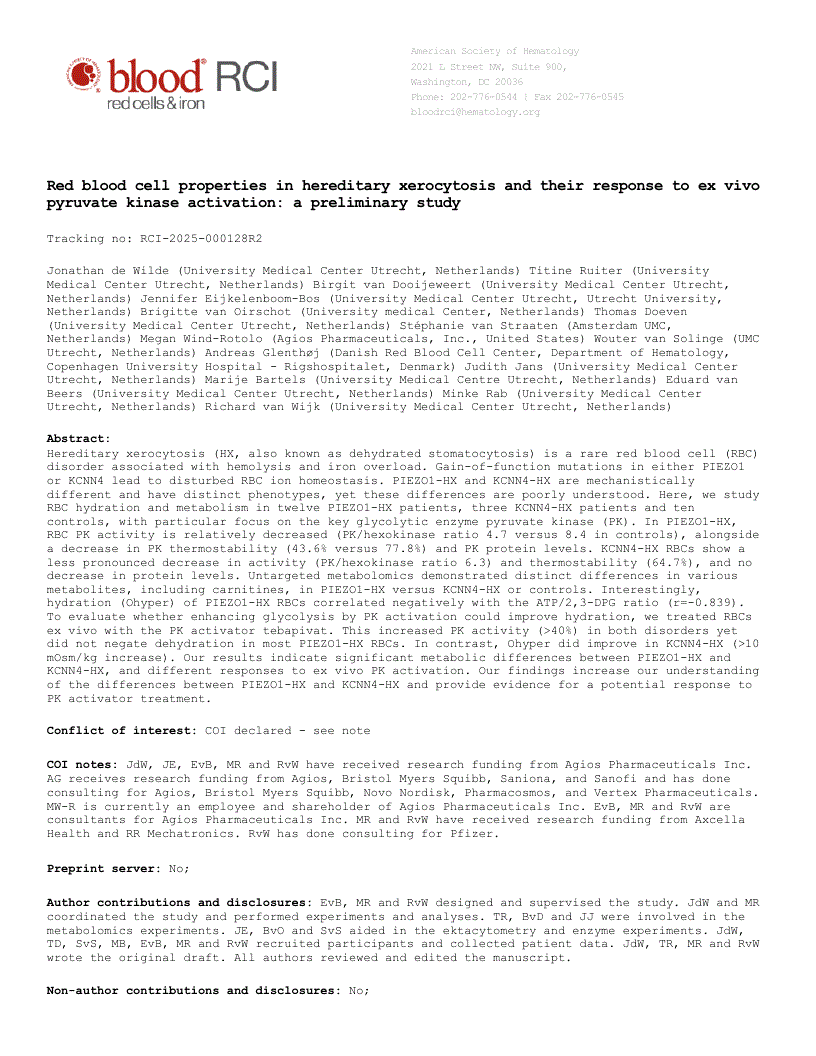KEY POINTS
PIEZO1- and KCNN4-hereditary xerocytosis red blood cells show distinct differences in functional and metabolic properties.
Ex vivo pyruvate kinase activation leads to increased energy levels, yet does not evidently improve hydration in PIEZO1-HX.
ABSTRACT
Hereditary xerocytosis (HX, also known as dehydrated stomatocytosis) is a rare red blood cell (RBC) disorder associated with hemolysis and iron overload. Gain-of-function mutations in either PIEZO1 or KCNN4 lead to disturbed RBC ion homeostasis. PIEZO1-HX and KCNN4-HX are mechanistically different and have distinct phenotypes, yet these differences are poorly understood. Here, we study RBC hydration and metabolism in twelve PIEZO1-HX patients, three KCNN4-HX patients and ten controls, with particular focus on the key glycolytic enzyme pyruvate kinase (PK). In PIEZO1-HX, RBC PK activity is relatively decreased (PK/hexokinase ratio 4.7 versus 8.4 in controls), alongside a decrease in PK thermostability (43.6% versus 77.8%) and PK protein levels. KCNN4-HX RBCs show a less pronounced decrease in activity (PK/hexokinase ratio 6.3) and thermostability (64.7%), and no decrease in protein levels. Untargeted metabolomics demonstrated distinct differences in various metabolites, including carnitines, in PIEZO1-HX versus KCNN4-HX or controls. Interestingly, hydration (Ohyper) of PIEZO1-HX RBCs correlated negatively with the ATP/2,3-DPG ratio (r=-0.839). To evaluate whether enhancing glycolysis by PK activation could improve hydration, we treated RBCs ex vivo with the PK activator tebapivat. This increased PK activity (>40%) in both disorders yet did not negate dehydration in most PIEZO1-HX RBCs. In contrast, Ohyper did improve in KCNN4-HX (>10 mOsm/kg increase). Our results indicate significant metabolic differences between PIEZO1-HX and KCNN4-HX, and different responses to ex vivo PK activation. Our findings increase our understanding of the differences between PIEZO1-HX and KCNN4-HX and provide evidence for a potential response to PK activator treatment.
Author notes
These authors contributed equally.
DATA AVAILABILITY STATEMENT: Data and protocols are available upon request (e-mail r.vanwijk@umcutrecht). Data will be shared as is compliant with the General Data Protection Regulation and European Union privacy laws.

